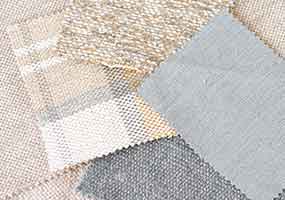
Weaving – the fabric of our business. Sourced from some of the best fabric mills in Europe, we procure fabrics for our own cushion manufacturing. We manufacture all our cushions for our furniture frames in our soft furnishings factory in Ilkeston, Derbyshire. Weaving is the fabric of our business. It is at the heart of what we do.
Our fabric suppliers have been working in the textiles industry for generations. Continuously innovating and developing great products with sustainability and the environment in mind.
Our Daro fabric collections feature high quality fabrics that are made from and contain recyclable content. We continuously strive to source fabrics that reduce the impact on the environment.
Many of our fabrics within our collection are produced using a jacquard weaving technique which is a process that is commonplace within the textiles industry.
Jacquard fabric is a type of fabric that is woven on a Jacquard loom. A Jacquard loom is a machine loom invented by the French textile artisan Joseph Marie Jacquard in 1804. Historically, The Jacquard machine was a device fitted to a loom that simplifies the process of manufacturing textiles with complex patterns such as brocade, damask and matelassé. The machine operated with punched cards that determined the path of the threads and therefore created the pattern within the fabric. The weaving process was conducted by the machine rather than allowing the thread path to be picked by the weaver operating the loom.
The Jacquard loom has evolved dramatically over the years. Textile manufacturers no longer operate these weaving machines with punched cards but instead Jacquard looms are operated by computer programs. Computerized Jacquard looms are advanced textile machines that reduce the need for human input. Making the process of weaving jacquard fabrics even more efficient and cost-effective.
Most textiles that feature complex, woven patterns are jacquard. While there are a few different subtypes of this fabric, each type of jacquard is used for similar purposes.
The most common types of textile fibres used to make jacquard are cotton, silk, and synthetic fibres. In some cases, textile manufacturers may also use wool to make jacquard fabric, but wool yarn is usually reserved for tapestries.
The environmental impact of jacquard woven fabric varies depending on the type of textile fibres this fabric contains. Cotton fabric, for instance, is highly biodegradable and it is also possible to cultivate cotton using sustainable and organic processes.
Our suppliers continuously work to produce fabrics from materials that minimise and avoid harm to the environment. There are many ways to produce recycled fabrics.
Our suppliers use many sustainable materials within their production to create eco friendly fabrics. Materials such as recycled polyester (rPET), ecolan (upcycled polypropylene) and regenerated cotton.
Recycled polyester, also known as rPET, is obtained by recycling post-consumer plastic bottles. The plastic bottles are cleaned and molten down. Followed by stretching into a fine, soft and ecological thread. Reducing the build up of plastic waste in our oceans.
Ecolan or upcycled polypropylene, is produced from excess materials from the oil industry. The released gasses in oil refineries are processed into white powder, which is molten into granules. Afterwards, these granules are processed into elegant threads. This processing method brings large benefits. Producing ecolan fibres requires no water, no PFC chemicals and low energy usage. Ecolan can be recycled up to 10 times and has an average life cycle of 100 years.
Regenerated cotton is often used in fabrics and is developed from remainder and waste yarns, collected during the production process of clothes or other fabrics. This mix of cotton, linen and/or polyester waste is completely recycled into new, durable yarns. This reduces textiles waste.
100% Organic Cotton is a type of cotton that is beneficial for both the environment and human health because it is planted and tended in fields that are free from synthetic chemical pesticides, herbicides and fertilisers. Spun and manufactured without toxins and chemicals.
Click here to explore more articles on our blog. Alternatively, tune into our YouTube channel to watch some handy “how to” videos, showing you how to care and maintain your Daro furniture so that you can enjoy it for longer.

Managed by Propel Marketing